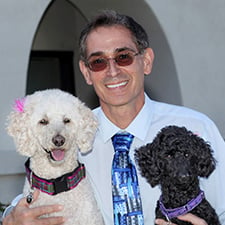As a medical student, do you ever wonder what it’s like to specialize in geriatrics and hospice and palliative medicine? Meet Karl Steinberg, MD, CMD, HMDC, a geriatrician and a featured physician in the AMA’s “Shadow Me” Specialty Series, which offers advice directly from physicians about life in their specialties. Check out his insights to help determine whether a career in geriatrics and hospice and palliative medicine might be a good fit for you.
The AMA’s Specialty Guide simplifies medical students’ specialty selection process, highlight major specialties, detail training information, and provide access to related association information. It is produced by FREIDA™, the AMA Residency & Fellowship Database®.
Learn more with the AMA about geriatrics and hospice and palliative medicine.
“Shadowing” Dr. Steinberg (@karlsteinberg)
Specialty: Geriatrics (post-acute and long-term care) and hospice and palliative medicine.
Practice setting: Nursing homes, assisted living facilities, home visits, hospice—no office practice.
Employment type: Solo practice with some medical directorships and consulting work.
Years in practice: 30.
A typical day and week in my practice: Each day is different, but most commonly I load up my dogs and head out to a few different visits—to nursing homes, assisted living facilities and house calls. As a nursing home and hospice medical director and chief medical officer, I also attend frequent quality meetings, do staff education and perform chart audits.
It’s quite variable week to week, but I don’t have to worry about a waiting room full of people and the inability to spend the amount of time I need with a patient or family—and that is a blessing.
The most challenging and rewarding aspects of geriatrics and hospice and palliative medicine: Because many of my patients are nearing the end of life, they are quite ill and complex for the most part. Even after these decades, it is still especially difficult and sad to take care of younger patients who are dying—and their families.
The work feels meaningful, and my presence and services seem to be genuinely appreciated by almost all my patients and their families. The absence of having to rush allows for time to listen and empathize, and helps create trust and connection between the patients and me.
Getting invited into patients’ homes creates a special kind of intimacy and perspective that is unlike anything you can get in an office or institutional setting, and I find that especially rewarding.
How life in geriatrics and hospice and palliative medicine has been affected by the global pandemic: Like almost everything else, it has opened the door to far more virtual encounters. They are not ideal, but they do make things convenient in many ways and they have worked surprisingly well. As a bonus, family meetings can now include people who are geographically remote and that has become much more of a regular practice as opposed to something exceptional.
The ability to do much of the work virtually has allowed me to spend more time up in the mountains, which has been a real blessing. That ability to get away into nature helps with coping.
The long-term impact the pandemic will have on geriatrics and hospice and palliative medicine: We will see an enduring trend toward more telemedicine in long-term care geriatrics and palliative care—although not everything can be done virtually, of course.
Three adjectives to describe the typical geriatrician: Kind, attentive and practical.
How my lifestyle matches, or differs from, what I had envisioned: Being able to set my own schedule and not having to be tied down to an office setting are things I did not envision when I was in school and residency. My current lifestyle has surpassed my expectations in every way. Supplementing my income with expert-witness work has made geriatrics and palliative medicine a very viable specialty.
Skills every physician in training should have for geriatrics and hospice and palliative medicine but won’t be tested for on the board exam: The ability to ask yourself, “What are the reasons to do this test or prescribe this drug, versus choosing not to recommend them?” Learning to talk about death, dying, fears, hopes and what is truly important. Listening skills, leadership skills, conflict resolution, nonviolent communication and self-care.
Questions physicians in training should ask themselves before pursuing geriatrics and hospice and palliative medicine: Am I OK taking care of a lot of people through difficult times in their lives? And am I OK losing a lot of patients when they die?
Books every medical student interested in geriatrics and hospice and palliative medicine should be reading:
- Being Mortal: Medicine and What Matters in the End, by Atul Gawande, MD, MPH.
- When Breath Becomes Air, by Paul Kalanithi, MD.
- The Corrections, by Jonathan Franzen.
The online resource students interested in geriatrics and hospice/palliative medicine should follow: For long-term care geriatrics, absolutely the Society for Post-Acute and Long-Term Care Medicine. There is a lot of good information on #MedTwitter. GeriPal blog is also fun, as is AMDA-on-the-Go for podcasts.
For hospice and palliative medicine, the American Academy of Hospice and Palliative Medicine and Center to Advance Palliative Care are good places to start.
Quick insights I would give students who are considering geriatrics and hospice/palliative medicine: It is a surprisingly colorful, unique, human experience that is extremely rewarding.
Mantra to describe life in geriatrics and hospice/palliative medicine: We will walk this path together.




